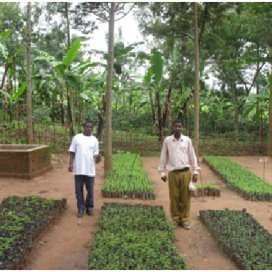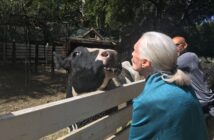Africa loses more than 10 million acres of forest every year. This intense rate of deforestation is devastating Africa’s flora and fauna, and is perhaps the most serious threat to the survival of chimpanzees and other great apes. The disappearance of forested habitats makes it near impossible for endangered chimpanzee populations to access the resources they desperately need to survive.
To combat the threat of deforestation, the Jane Goodall Institute (JGI) has teamed up with several communities located in and around chimpanzee habitat areas to introduce a variety of conservation projects. By working with local communities JGI ensures that not only are practices destroying Africa’s forests curtailed, but that the people living in these communities are given opportunities for alternative, sustainable livelihoods that help them rely less on the forest for their needs.
One such opportunity JGI has introduced to communities in Tanzania is the establishment of tree-nurseries. JGI trains villagers on how to plant and care for seedlings for a variety of trees; trees that provide villagers with medicine, firewood, and food. These trees are then planted by villagers on homesteads, farms, and woodlots. In addition to providing the aforementioned resources for villages, these trees also improve the area’s soil fertility and ensure that wild trees in the forest are not cut down.
Bonaventura Luzilo is one local community-member who has benefitted from JGI’s tree-planting initiative. Having learned how to cultivate trees in one of JGI’s tree-nurseries, Luzilo now owns his own woodlot and coffee farm where he cultivates a variety of tree-species. Not only is Luzilo no longer relying on the forest for food and an income, he has dramatically increased his family’s economic stability.

Every year, Luzilo grows 100 trees and makes roughly 1,750,000 TZS by the selling the wood from these trees. This income allows Luzilo to send his children to school and cultivate other crops to feed his family. Luzilo also never has to worry about chopping down wild trees for firewood, as there are more than enough fallen twigs and branches from his tree crop to provide his family with fuel. In fact, Luzilo’s situation has improved so much that he has been able to build two new homes, one for his family and one for his mother.
When Luzilo is not managing his woodlot he serves as a village forest monitor, making sure that resources from the forest surrounding his village are being used and harvested in a responsible, sustainable manner. Monitoring the forest is a source of great pride for Luzilo, and there is no question that his pride in the forest will impact the way his fellow community-members view their place in the environment and respond to further community-centered conservation initiatives.






